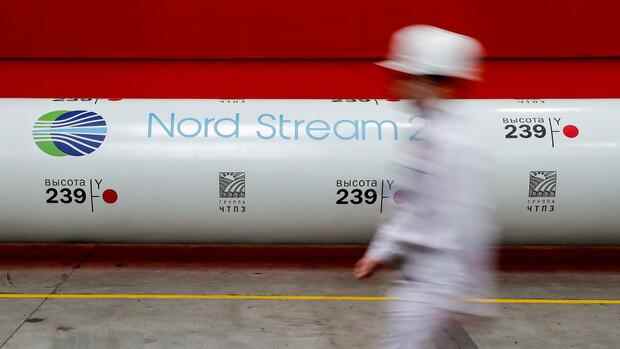The economic benefit of the gas pipe is much less than the geopolitical damage.
If proof was needed that Olaf Scholz is determined to become Angela Merkel’s legacy, then the Chancellor has now delivered it. Without need, the German Prime Minister tried his predecessor’s mantra that the Nord Stream 2 pipeline was a “purely private-sector project”.
That was not true even in the era of Gerhard Schröder, who had already realized Nord Stream 1 together with the “flawless democrat” Vladimir Putin. In Merkel’s chancellorship, when Putin embarked on his aggressive foreign policy course, the collateral damage to German pipeline policy took on worrying features: America was raging – and by no means only Donald Trump. Western Europe never really understood the pipeline connection. And Eastern Europe, Poland, the Balts and above all the Ukraine, whose protection from Russia the West has made a strategic goal, see themselves abandoned by Berlin. With its pipeline policy, Germany is now largely isolated. But if there is such a thing as a raison d’étre for German foreign policy, it is to avoid precisely such a scenario.
Top jobs of the day
Find the best jobs now and
be notified by email.
The disdainful concrete-sheathed steel pipe – it has become the geopolitical issue par excellence. And the fact that the Chancellor is also hiding behind Merkel’s overused and false mantra shows only one thing: German diplomacy has maneuvered itself into a dead end. From a real-political point of view, it is almost unthinkable that gas flows from Russia to Europe via Nord Stream 2 while Putin is sending his troops to Ukraine – and is writing another chapter on the subject of historical revisionism against international law. The only positive point of the Baltic Sea tube is that the Kremlin ruler could be deterred from his expansion plans by a credible threat from Berlin to make the pipeline available.
Overall, the following applies: The economic benefit of the tube is much less than the geopolitical damage. Because even the end of the pipeline does not have to mean that Germany will no longer buy Russian gas for a long time. The capacities of the existing pipelines are definitely sufficient. Right from the start, it was daring to tie the German gas supply via another Baltic Sea pipeline to a Russia that is increasingly giving birth to imperialism under Putin. The signing of the treaties a good year after the crime annexation was seen as a sign of reconciliation by Putin, who already considers the West to be (decision) weak. “Change through trade” is an honorable but difficult foreign policy concept. In German pipeline policy, it can be viewed as a failure. The opportunity to correct is now.
Cons: We need Russian gas
The energy transition will not work without Russian gas.
From Jürgen Flauger
Of course, Nord Stream 2 has been a political issue since the decision to build the second Russian pipeline through the Baltic Sea was made six years ago. Ukraine and Poland opposed the project early on and have since received a lot of support from EU politicians, but also from Germany, and even the USA is involved in the debate. But that is not in Germany’s interest. Berlin should do everything possible to prevent the dispute over Nord Stream 2 from escalating further. And Berlin is certainly not allowed to participate in questioning the billion-dollar project as a sanction against Russia.
Germany needs gas, in large quantities – and especially from Russia. More than many other European countries. In contrast to the French, Germany is pulling out of nuclear energy and will end coal-fired power generation much earlier than the Poles. The new federal government wants to accelerate the pace of the energy transition again. By the end of this decade, the coal phase-out should be completed and renewable energies should cover 80 percent of the electricity demand. But all of this is only possible with gas. Germany will only avoid blackouts if new gas-fired power plants are built on a large scale – and these are available when the wind isn’t blowing or the sun isn’t shining.
As appealing as it seems to threaten Russia with a blockade of Nord Stream 2 so that President Vladimir Putin can end his provocations against Ukraine and the West, it is just as dangerous for Germany. Russia fulfilled its obligations to customers in the West even during the Cold War. And even during the current bottleneck, wholesalers emphasize that what is ordered will be delivered. But how would Moscow react if a practically finished pipeline, costing around ten billion euros, were still prevented for the last few meters? There could be no clearer suggestion for Russia to look for other sales channels in Asia.
When Nord Stream 2 is up and running, Russia has an interest that it will always be full. And as much as Poland and Ukraine fear for their influence in the transit of gas, the direct connection through the Baltic Sea is just as reliable for Germany.
Of course, Germany needs to secure as many options as possible to purchase natural gas, perhaps building a terminal for liquefied gas (LNG) after all. But the energy transition will not work without Russian gas. Energy policy has to reconcile climate protection, competitiveness and security of supply – it should not be burdened with foreign policy.
More: Natural gas continues to flow eastward through the Yamal pipeline
